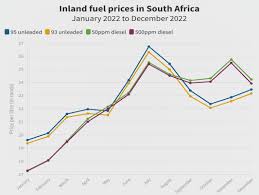The Current State of Petrol Prices in South Africa
As of October 2023, petrol prices in South Africa have seen a noticeable increase, sparking concerns among consumers and experts alike. The adjustment, enacted on the 1st of October, raised the price of 95 unleaded petrol by R1.00 per litre, bringing it to R24.38 in Gauteng, mimicking a similar pattern in other provinces.
Factors Influencing the Price Hike
The sharp rise in petrol prices can be attributed to several key factors:
- Global Oil Prices: Fluctuations in global crude oil prices have a direct impact on local petrol prices. Recent increases in oil demand coupled with geopolitical instability have driven prices higher.
- Rand Depreciation: The ongoing weakening of the South African rand against major currencies adds to the increasing cost of imports, particularly oil, which is priced in dollars.
- Transportation Costs: Rising logistics costs due to inflation and supply chain disruptions also contribute to the overall price escalation.
Impact on Consumers and Economy
The rising petrol prices have significant implications for the South African economy and its citizens. The increased costs are likely to affect various sectors, including transport, agriculture, and tourism, ultimately leading to higher prices for goods and services. Consumers are expected to feel the pinch as their disposable income diminishes, leading to a decline in purchasing power.
Looking Ahead: Forecasts and Expectations
Experts anticipate that if global oil prices continue to rise or the rand remains weak, further increases may be on the horizon. The government is urged to consider strategies such as fuel tax adjustments or subsidies to mitigate the impact on households and businesses. Additionally, shifts towards alternative energy sources and enhancing public transportation could alleviate some pressure in the long term.
Conclusion
The rise in petrol prices in South Africa presents a challenge that mirrors global economic trends. With inflation already straining household budgets, understanding the dynamics of petrol pricing is crucial for consumers and businesses alike. As individuals and communities adjust, the broader implications for the economy will be closely monitored. It remains essential for stakeholders to engage in dialogue to promote sustainable solutions that ease the burden on consumers while fostering economic resilience.


